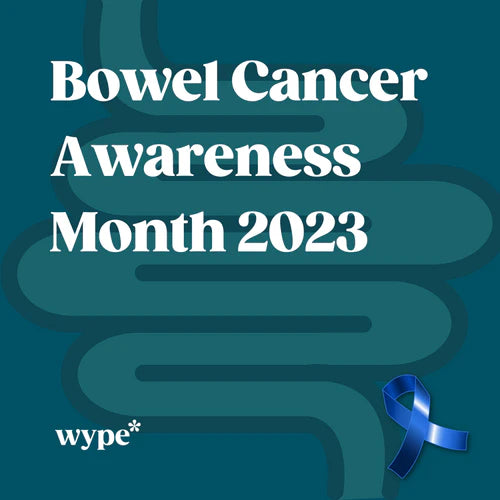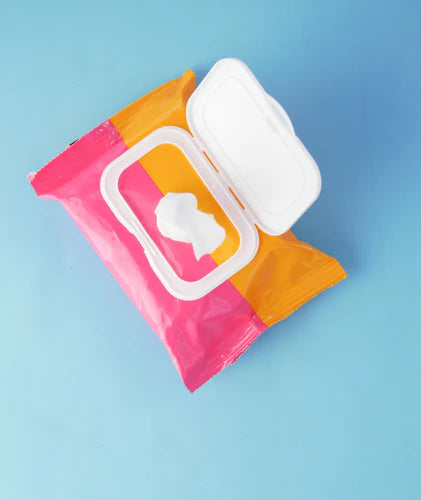Don't ignore your gut: Understanding bowel cancer and its signs and symptoms

Don't ignore your gut: Understanding bowel cancer and its signs and symptoms
Here at Wype we like to talk bums and have a laugh, but at the same time we value our connection with our community who provides us with feedback on the daily. One of the things we have learnt from our privileged position behind the sacred doors of the toilet, is that there is a huge amount of stigma around bowel habits. There are many ways that these taboos can become harmful, it's not all about keeping the conversation polite and table-friendly!
This year we want to spend some time and effort in shedding light on where bowel health meets the pocelain throne (and beyond). Spreading awareness that there is NO SHAME in speaking to a relative or going to the GP to talk about what's going on in the privvy is fundamental, and this month, we are starting with bowel cancer.
What even is the bowel anyway?
To put it simply, the bowel connects the stomach to the (he-hem) back door, made up of the small intestine, large intestine, colon, and rectum. But don’t get it twisted, the bowel doesn’t just carry waste out of the body.
The incredible machine that we call the bowel removes all the nutrients we need to fuel our bodies from the food we eat, whilst expelling any unwanted waste. The world's most efficient filing assistant ever!!
The mystic nature of the bowel
We’ll never stop shouting about how much we love the bowel, it’s some hardcore biological machinery, not to mention super interesting.
When the small and large intestine are stretched out, they reach about 22ft in length (what’s that? Over triple the average height of a person?), and it just happens to perfectly sit in your abdomen.
What about the fact the gut has been named the ‘second brain’ with 2 thin layers of around 100 million nerve cells lining your gastrointestinal tract. And don’t even get us started on the fact that 95% of your body's serotonin (a hormone responsible for your mood, sleep and sex drive among other important functions) is produced there!
What is bowel cancer and how does it happen?
Bowel cancer is caused by abnormal cells in the bowel that start to grow and divide in a way that they shouldn’t, creating what we call polyps (little skin tags in the bowel). Not all polyps are dangerous, but if left untreated and not caught early, these polyps can develop into a tumour.
Nearly 43,000 people are diagnosed with bowel cancer every year in the UK, so awareness is key when it comes to catching it early.
The most important thing we can tell you about bowel cancer is, although it’s the second largest cause of cancer deaths in the UK, there’s a 91% survival rate when bowel cancer is caught early.
Signs & symptoms
The symptoms of bowel cancer can vary from person to person depending on lots of different factors, but here are some of the main ones:
-
Blood in the stool or rectal bleeding
-
A change in bowel habits, such as diarrhoea or constipation
-
New abdominal pain or discomfort
There’s no need to panic if you run into any of these symptoms! They can be caused by so many other things.
Just because you feel a bit gassy after a big meal doesn’t mean you have bowel cancer, but if you notice a change that lasts for a few weeks, just listen to what your body is trying to tell you and have a chat with your GP.
Around here, we don’t worry, we just stay informed and check our poop!
Family history, age, and other chronic issues can tell us more about our risk of bowel cancer, so make sure to always discuss your history with your GP too.
Stay in the loop, check your poop!
Here at Wype, we’re big fans of looking at poop! Is that weird? There’s no great way to put it really. But in reality, our poop can tell us so much about ourselves (mainly our diet and our bowel health).
We don’t know who went to Bristol and hated it enough to name a chart about poop after it, but the Bristol Chart is usually used to track fibre in our diet.
However, when it comes to checking our droplets in terms of bowel cancer, we’re looking for different coloured poop. If we notice that our stool is dark red or black, or looks similar to treacle or tar, this can signal that there might be a bit of blood in the mix.
If you notice anything like this, don’t worry! Just chat to your GP and see what’s going on.
Prevention, prevention, prevention (and prevention)
There are several steps you can take to reduce your risk of developing bowel cancer, and luckily, they’re all pretty simple:
-
Get those fruits and veggies in and cut back on processed foods
-
Get moving (run, dance, skip, hopscotch, anything!)
-
Stop huffing and puffing on the ciggies
-
Hold it on the Saturday night martinis
Get screening!
Regular screening for bowel cancer is super important when it comes to making sure everything’s all good in the hood.
There’s no shame in talking to your doctor or loved ones about this kind of thing. It can feel embarrassing talking about these types of issues, but having healthy and open conversations makes a world of difference when we’re feeling like something’s not quite right back there.
At Wype, we want to be a part of this change, opening the conversation around tricky topics so that we can all get the help and support that we need from those around us. Sometimes just starting the conversation is enough to kickstart healthier habits and make the first step towards understanding what’s going on with our bodies.
The bottom line
Life can throw all sorts at us, and as long as we’re keeping in check with our bodies, looking after ourselves, and taking the right steps when something doesn’t seem quite right, we can rest assured we’re doing the best thing for ourselves!
Check out the NHS website for more information on bowel cancer.
And remember...CHECK YOUR POOP!



